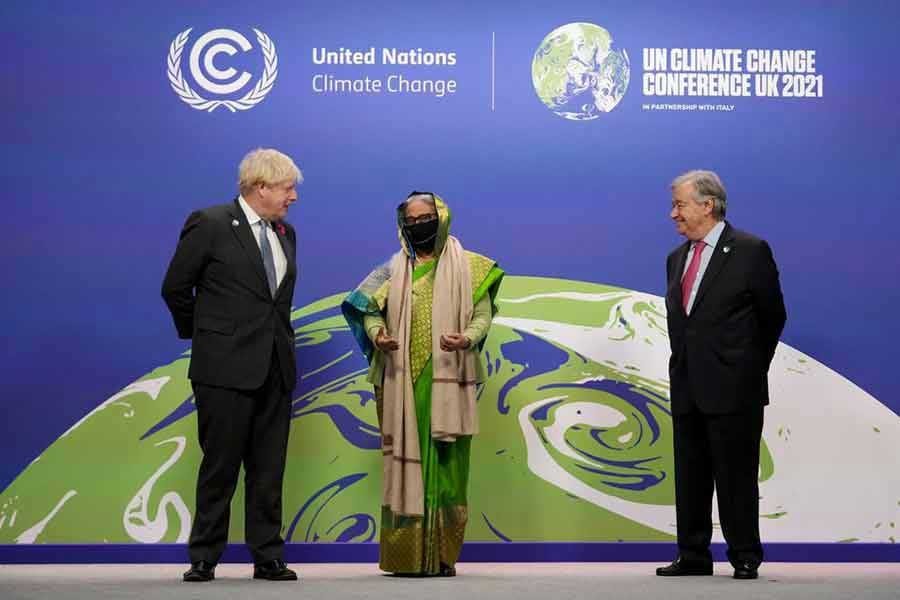Now that the COP26 enters its tenth day, its participants are visibly in a race against time to reach an agreement acceptable to the national and non-government representatives. This has been the spectacle on the concluding days at all the Conference of the Parties meets. The most turbulent of these wrangling was seen at the end of the Paris Climate Accords global meet in 2016. A countdown to the conclusion of the 13-day 'Conference of the Parties' 2021 is tentatively in place. Already, climate veterans present at the COP26 at Glasgow in Scotland have started giving vent to their feelings about the performance and outcome of the conference. One such senior expert called the 2021 Conference of the Parties (COP) the poorest planned to date. A lot of others coming from different parts of the globe upon being threatened with climate change appeared blasé about Earth's future. A number of them called the target of keeping the world's emission target at 1.5 degrees Celsius mere exercises in a reverie.
Observers have discovered that while the COP-26 meeting tries to arrest emissions and keep warming within the Paris deal limit of 1.5 degrees Celsius, a new report from the United Nations Environment Programme (UNEP) is focused on the need for preparing countries for effects which have already started to be felt. The impacts are so alarmingly visible that they cannot be glossed over by the territories seasoned with emission fallout. Given the nonstop hide-and-seek and the reneging on climate promises made at previous climate colloquiums, the planet could be termed headed for doom, and that, too, in the near future. As a ghost of sloth or a wilful dilly-dallying on adopting climate actions rules the roost, there are ample reasons for Sir David Attenborough or Greta Thunberg to feel unconvinced of the setting of pragmatic goals.
That most of the climate pledges are sheer balms on raw bruises has long been proved. Finding no escape route, the poorer vulnerable countries are just sleepwalking, finding themselves stuck in a maze. On being lured by the apparently illusory climate fund, these nations have continued hoping against hope. They are veritably in the pursuit of devices on how just to keep afloat in the approaching crises like the sea-level rise and global warming caused by carbon emission.
Against this gloomy backdrop, the UNEP is delving deep into the world's fast worsening impasse. Perhaps echoing an SOS from the drowning nations, the UN agency says, "Even if we were to turn off the tap of the greenhouse gas emissions today, the impacts of climate change would be with us for many decades to come." That the poorer nations would have a spectacular presence at the COP26 had been quite foretold. Battered by storms, floods, and droughts triggering uncertainties and outbound mass migrations, the world's poor and vulnerable segments are found at the heart of the climate negotiations. In unison, they have repeated the calls for the richer countries to honour their pledge to provide $100 billion annually as climate funds.
Bangladesh has yet to find enough reasons at the moment to fully include itself in these groups haunted by the spectre of climate-change impacts. But its days of climate assaults are not too far. Due to this reason, it has also included itself in the list of nations awaiting their share of the global climate adaptation fund.
In almost all international climate conferences and the Earth Summits since the first one, Bangladesh has been an active participant. Though not on the path of climate-change trail of devastating impacts, the country has long been bracing for long-term consequences of the erratic global climate. Of them, the most immediate danger comes from the much dreaded sea-level rise. The land has never been seen among the island-nations like Maldives which faced the threat of being fully engulfed by the rising sea. But the global warming-spurred rise in the sea level kept haunting large tracts of coastal land in the country's south. According to observers monitoring the vulnerability and the future plight of the people living in the Bangladesh coastal belt, the process of sea-level rise in the country's long coast is set to begin soon --- ironically, for no fault of theirs.
Despite the country's present deteriorating air quality, it is not considered a significant carbon-emitting country. Except for the fast depletion of its green patches, river and water body grabbing, indiscriminate killing of wildlife and the levelling of hills, the small country has occasionally demonstrated its capability to cope with the future weather and climate disasters. But with the lukewarm response from a few industrialised nations to appeals by a large number of countries presages alarming turn of things. The developing nations attending the climate meets for eliciting promise from big polluters to keep the emission cap within 1.5 degrees Celsius feel highly disillusioned.
It's really unfortunate for mankind to find a few global economic giants not budging from their hesitant stance taken at the 2016 Paris Accords on the emission target of 1.5 degrees Celsius. At the climate meet in Geneva in 1979, after the first-ever Earth Summit in Stockholm in 1972, followed by Kyoto Protocol in 1997, the UN Framework Convention on Climate was signed in Brazil's Rio de Janeiro and New York, USA, in 1992 and 1993 respectively. But a strong consensus on carbon emission remained elusive. Bangladesh Prime Minister Sheikh Hasina has emerged as an active mouthpiece of climate protection at the Glasgow COP26. She remained optimistic all along on this front. For her part she informed the conference about Bangladesh's closure of 10 plants run on coal, the dirty fossil fuel. The world, except a few nations, has launched a collective fight against carbon. Bangladesh has reasons to take pride in its unwavering resolve to make Earth free of all adversities tied to climate change.
shihabskr@ymail.com


